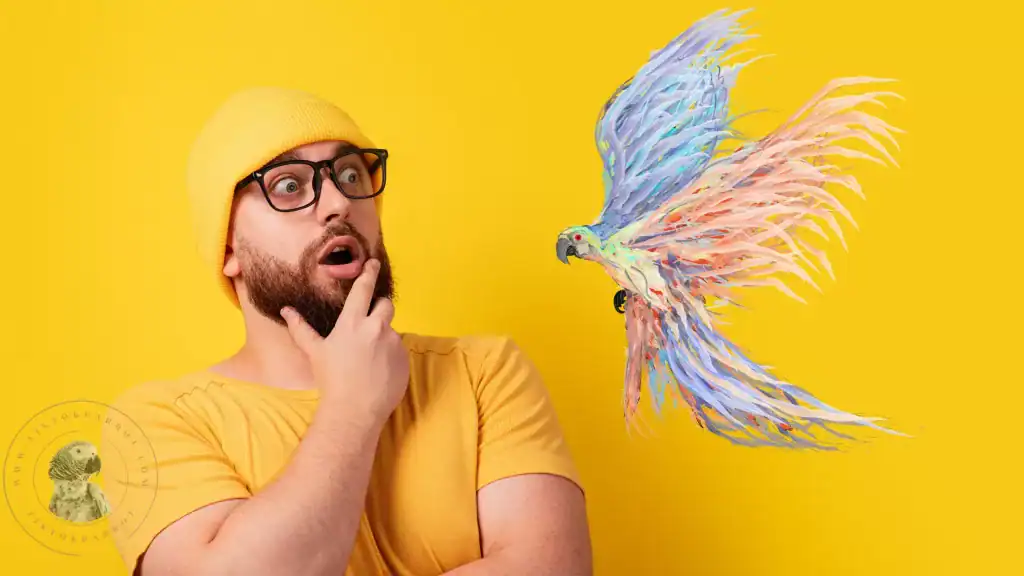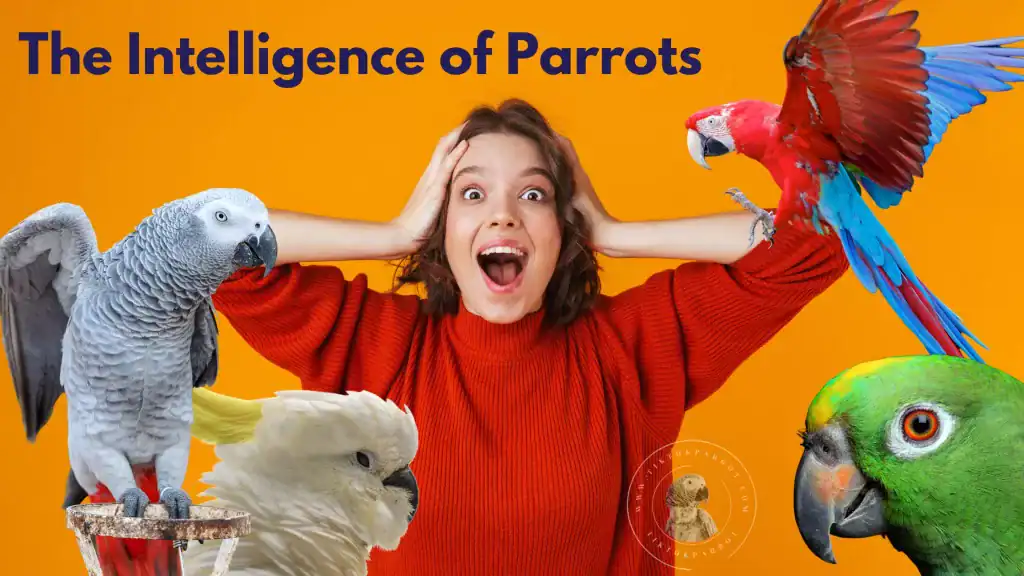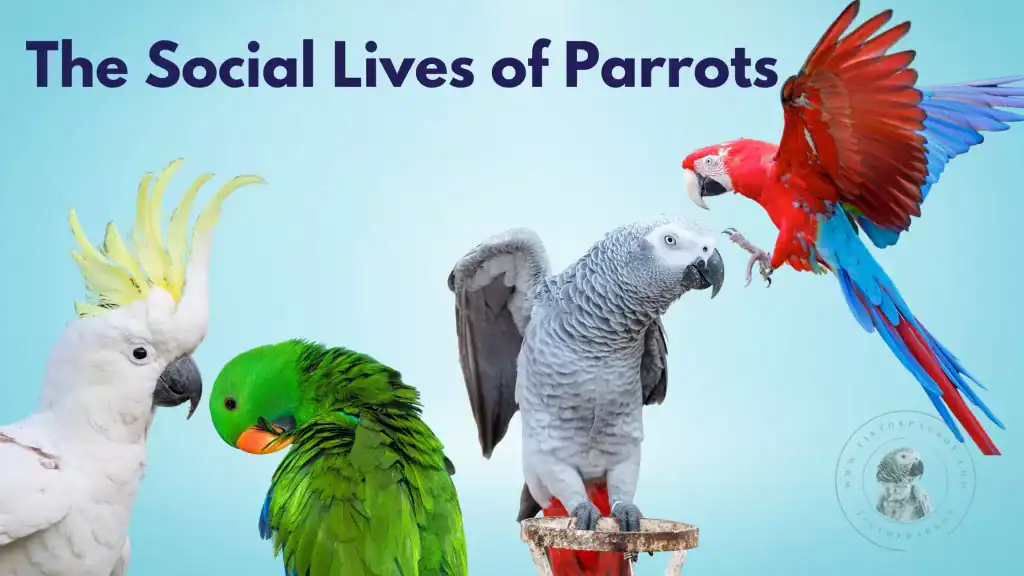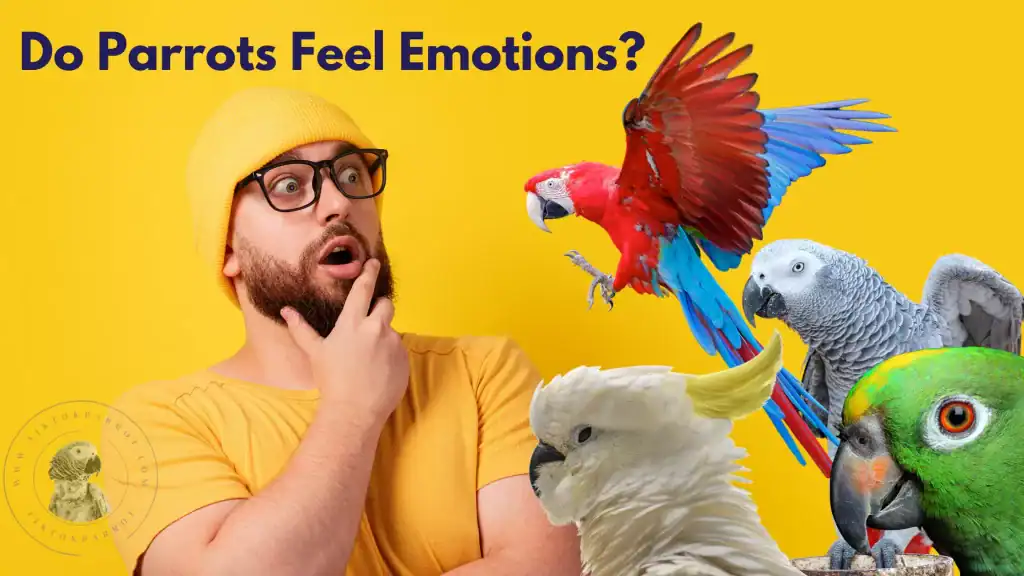Parrots are known for their remarkable ability to imitate human speech and sounds, but they are also highly intelligent birds with complex social lives. Many parrot owners believe that their birds are capable of recognizing and remembering faces, and even experience emotions like love and longing for human companionship.
But is there any scientific evidence to support these claims? In this article, we will delve into the world of parrot behavior and intelligence to see what we can learn about these fascinating birds.
Are parrots capable of recognizing faces and experiencing emotions like humans? This comprehensive article explores the latest research on parrot intelligence and behavior, answering unique FAQs and providing tips for bonding with your feathered friend. Whether you’re a parrot owner or simply fascinated by these intelligent creatures, this article is a must-read.
The Intelligence of Parrots
Parrots are known for their intelligence, which rivals that of primates and dolphins. They have large brains relative to their body size, and their cognitive abilities have been studied extensively in laboratory settings.
Parrots have been shown to possess a wide range of cognitive skills, including problem-solving, tool use, and even self-awareness.
One of the most remarkable abilities of parrots is their capacity for vocal mimicry. They are able to imitate a wide range of sounds, including human speech, animal noises, and even electronic sounds like car alarms and telephones.
Some parrots have even been taught to speak entire sentences and hold simple conversations with their human companions.
The Social Lives of Parrots
Parrots are also highly social animals, living in large flocks in the wild. They engage in complex social behaviors, including grooming, play, and courtship displays. In captivity, parrots often form close bonds with their human caretakers, and may become distressed when separated from them for extended periods of time.
However, parrots can also be prone to behavioral problems if they are not given adequate social stimulation. In the absence of a mate or flock, a pet parrot may become bored and lonely, leading to behaviors like feather plucking and excessive screaming.
It is important for parrot owners to provide their birds with plenty of mental and social stimulation to prevent these issues.
Parrots and Human Companionship
Many parrot owners report that their birds seem to crave human companionship, and may become attached to specific individuals in the household. Some parrots have even been known to develop romantic attachments to their human companions, engaging in behaviors like regurgitating food and preening.
While it is clear that parrots can form close bonds with humans, the question remains as to whether they experience emotions like love and longing.
Some scientists argue that parrots are simply responding to the social cues and attention provided by their human caretakers, rather than experiencing genuine emotions.
Do Parrots Remember Faces?
One of the most intriguing questions about parrot behavior is whether they are capable of recognizing and remembering human faces. While there is some anecdotal evidence to suggest that parrots can recognize individual faces, there has been little scientific research on the topic.
A recent study published in the journal Scientific Reports provides some evidence that parrots may indeed be capable of recognizing individual faces. Researchers trained a group of six Goffin’s cockatoos to identify photographs of human faces using a touch screen interface.
The birds were able to correctly identify the faces of familiar humans, as well as distinguish between different unfamiliar faces.
While this study provides some intriguing evidence that parrots may be able to remember and recognize human faces, it is important to note that it was conducted with a small group of birds in a laboratory setting. More research is needed to determine whether parrots are able to recognize faces in more complex and naturalistic environments.
Do Parrots Feel Emotions?
Another question about parrot behavior is whether they are capable of experiencing emotions like love, longing, and sadness. While it is difficult to determine exactly what emotions a non-human animal may be experiencing, there is some evidence to suggest that parrots are capable of experiencing a range of emotions.
For example, a study published in the journal Animal Cognition found that African grey parrots were able to use their voices to communicate their emotional state. When presented with a range of stimuli, the birds produced vocalizations that differed depending on whether they were feeling positive, neutral, or negative emotions.
While it is clear that parrots are capable of complex social behavior and may experience a range of emotions, it is important to remember that they are not humans and may experience emotions differently than we do.
Can Parrots Miss You?
Yes, parrots can miss their owners and become upset or depressed when they are separated from them for extended periods. Parrots are highly social animals that form strong emotional bonds with their owners and can become attached to them as if they were members of their own flock.
When an owner leaves or is absent for a long time, a parrot may experience separation anxiety and exhibit behaviors such as calling out for their owner, becoming withdrawn, or showing signs of stress.
It’s important for parrot owners to establish a routine and spend quality time with their birds to maintain a strong bond and prevent separation-related issues.
Do parrots know their names?
Yes, parrots can learn to recognize their own names, along with the names of other individuals and objects in their environment. Parrots are highly intelligent and social animals that have excellent memories and can learn to associate specific words or sounds with people, things, and actions.
When training a parrot to recognize its name, it’s important to use consistent and positive reinforcement techniques, such as offering treats or praise when the bird responds to its name. With patience and practice, most parrots can learn to identify themselves by name and respond when called.
However, it’s important to note that not all parrots will learn their names, and some may prefer to respond to other sounds or cues instead.
Do parrots like when you kiss them?
While some parrots may enjoy receiving physical affection from their owners, such as petting or scratching, not all parrots enjoy being kissed. Parrots have individual personalities and preferences, and some may find certain types of physical contact stressful or uncomfortable.
In addition, kissing a parrot on the beak or head can potentially transmit bacteria or diseases, and should be avoided for the health and safety of both the bird and the owner.
Instead, it’s important to respect a parrot’s personal boundaries and communicate with them in ways that they find comfortable and enjoyable, such as offering treats, toys, or verbal praise.
Which Parrots Can Remember Faces & Miss Your Presence?
Several species of parrots are known for their ability to remember faces and miss the presence of specific individuals. These include:
- African Grey Parrots: These parrots are considered one of the most intelligent bird species, and they have an excellent memory. They can recognize and remember faces for years and can become attached to specific individuals. African Grey Parrots have an average lifespan of 40-60 years and can live up to 80 years if looked after well.
- Amazon Parrots: Amazon parrots are known for their strong social bonds and can become quite attached to their owners. They are also known for their ability to remember faces and voices. Amazon Parrots have also a long lifespan, between 25-60 years and can live up to 70-80 years if looked after well.
- Eclectus Parrots: These parrots have a remarkable ability to recognize and remember faces, and they can become deeply attached to specific individuals. They are also known for their strong emotional bonds with their owners. Eclectus Parrots life span in captivity is 20-30 but in the wild up to 50 years.
- Cockatoos: Cockatoos are highly social birds and can develop strong bonds with their owners. They are also known for their excellent memory and can remember faces for years. Cockatoos lifespan average lifespan in captivity is anywhere between 50 – 70 years.
- Macaws: These amazing parrots form strong emotional bonds with their owners and can experience separation anxiety. They may call out, become withdrawn, or show signs of stress when separated for extended periods. Macaws average lifespan is between 40 and 50 years in the wild. In captivity a well looked after Macaw can live up to 75 years.
Overall, parrots are intelligent and social animals that can form strong bonds with their owners. They have the ability to recognize and remember faces, voices, and even specific words and phrases.
How to Bond with Your Parrot
If you are a parrot owner, you may be wondering how you can form a close bond with your bird. Here are a few tips to help you bond with your feathered friend:
- Spend plenty of time with your parrot each day, engaging in activities like play, training, and socialization.
- Offer your parrot a varied and interesting diet, including plenty of fresh fruits and vegetables.
- Provide your parrot with plenty of toys and other forms of enrichment to keep them mentally stimulated.
- Speak to your parrot in a calm and reassuring tone, using their name and other familiar words to help them feel secure.
- Avoid punishing or scolding your parrot, as this can damage the bond between you and your bird.
My Closing Thoughts
I would say, parrots are fascinating and complex animals that have captured our hearts and imaginations for centuries. While there is still much to learn about their behavior and intelligence, there is some evidence to suggest that they may be capable of recognizing and remembering faces, as well as experiencing a range of emotions.
If you are a parrot owner, it is important to provide your bird with plenty of mental and social stimulation, as well as a secure and nurturing environment. Now I would list down some of the most frequently asked questions about parrots.
FAQs (frequently asked questions)
Can parrots really talk?
Yes, many species of parrots are capable of mimicking human speech and other sounds.
Do parrots make good pets?
Parrots can make excellent pets, but they require a lot of attention and care.
How can I tell if my parrot is happy?
A happy parrot will typically be active, engaged, and vocal. They may also engage in behaviors like preening and playing with toys.
Do parrots need companionship?
While parrots can form close bonds with humans, they also benefit from social interaction with other parrots.
How long do parrots live?
The lifespan of a parrot can vary depending on the species, but many parrots can live for several decades with proper care.
Can parrots learn to perform tricks?
Yes, with proper training and positive reinforcement, many parrots can learn a variety of tricks and behaviors.
What is the best way to train a parrot?
Positive reinforcement techniques like clicker training and target training are often the most effective and humane methods for training parrots.
Can parrots get lonely if left alone for long periods of time?
Yes, parrots are highly social animals and can become bored and lonely if they are not given enough social interaction and mental stimulation.
How much time should I spend with my parrot each day?
Ideally, you should spend several hours each day interacting with and providing mental stimulation for your parrot.
Do all parrot species have the ability to mimic speech?
No, not all parrot species are capable of vocal mimicry. However, many popular pet parrot species like African greys, cockatoos, and Amazon parrots are known for their ability to mimic speech.
What should I do if my parrot starts biting me?
Biting can be a sign of fear, aggression, or territorial behavior in parrots. It is important to understand the underlying cause of the biting behavior and work to address it through training and socialization.
What is the best diet for a pet parrot?
A healthy diet for a pet parrot should include a variety of fresh fruits and vegetables, high-quality pellets, and occasional treats like nuts and seeds.
Can parrots fly?
Yes, most parrot species are capable of flight. However, many pet parrots have their wings clipped to prevent them from flying.
How do I know if my parrot is sick?
Signs of illness in parrots can include lethargy, loss of appetite, changes in behavior, and respiratory problems. It is important to consult with a veterinarian if you suspect that your parrot is ill.
How often should I clean my parrot’s cage?
Parrot cages should be cleaned on a daily basis, with a thorough cleaning and disinfection at least once a week.
Do parrots need to bathe?
Yes, regular bathing is important for a parrot’s hygiene and health. This can be accomplished through misting, showering, or providing a shallow dish of water for the bird to bathe in.
What kind of toys do parrots like?
Parrots enjoy a variety of toys, including chew toys, puzzles, and interactive toys that encourage socialization and play.
Can parrots be potty trained?
Yes, some parrots can be trained to use a designated area as a toilet. However, this requires consistent training and may not be feasible for all parrots.
Are parrots endangered?
Many parrot species are threatened or endangered due to habitat loss, poaching, and other factors. It is important to support conservation efforts to protect these beautiful and intelligent birds.
What should I do if I can no longer care for my parrot?
If you are unable to continue caring for your parrot, it is important to find a reputable rescue or adoption organization that can provide a loving home for your bird.
How do I know if my parrot is happy?
A happy parrot will typically exhibit behaviors like vocalizing, playing with toys, and engaging in social interactions with their human and avian companions.
Can parrots live alone, or do they need a mate or flock?
While parrots can form close bonds with humans, many species also benefit from social interaction with other parrots. Some parrots can live alone if provided with enough social stimulation and attention from their human caretakers.
What are some common health problems that affect parrots?
Parrots can be prone to a range of health problems, including respiratory infections, nutritional deficiencies, and feather plucking.
Can parrots be trained to do household chores?
While parrots can be trained to perform a variety of tricks and behaviors, they are not well-suited for household chores like cleaning or cooking.
How long does it take to train a parrot?
The time it takes to train a parrot will depend on the individual bird and the training techniques used. It may take several weeks or months to train a parrot to perform a new behavior.
Can parrots learn to recognize colors or shapes?
Yes, some parrots have been trained to recognize and distinguish between different colors and shapes.
How should I introduce my parrot to new people or animals?
Introduce your parrot to new people or animals slowly and in a controlled environment. Use positive reinforcement techniques to encourage your parrot to feel comfortable and secure.
Can parrots be trained to do tricks without using treats?
While treats can be a useful tool for training parrots, it is possible to train them using positive reinforcement techniques like praise and attention.
What should I do if my parrot starts screaming excessively?
Excessive screaming can be a sign of boredom, anxiety, or other behavioral issues in parrots. It is important to address the underlying cause of the screaming through training and socialization.
What is the best way to socialize a parrot?
Socializing a parrot involves exposing them to a variety of people, animals, and environments in a positive and controlled way. Gradual and consistent exposure is key to successful socialization.
Can parrots learn to use a litter box?
While it is possible to train some parrots to use a litter box, this may not be feasible for all birds and requires consistent training and reinforcement.
How much sleep do parrots need?
Parrots require 10-12 hours of sleep each night, and may also benefit from naps during the day.
Can parrots learn to solve puzzles or play games?
Yes, many parrots enjoy puzzles and interactive games that challenge their cognitive abilities and provide mental stimulation.
How do I know if my parrot is stressed?
Signs of stress in parrots can include feather plucking, aggression, and changes in appetite or behavior. It is important to identify and address the underlying cause of the stress.
Do parrots need to see a veterinarian regularly?
Yes, regular veterinary check-ups are important for maintaining a parrot’s health and detecting any potential health problems early.
If you found this blog helpful, It would be great if you could share it with your family and friends who might find it useful as well.
You might like to read these as well 🙂
Understanding of Grey Parrot’s Body Language
The Surprising Benefits of Owning an African Grey Parrot
Is Your African Grey a Jealous Bird? Here’s What You Need to Know!
African Grey Parrot Male or Female? (Determine Gender of African Grey)
The Mesmerizing Eyes of African Grey Parrot & What They Can Tell
African Grey Parrots: The Ultimate Guide to Care and Training
Unlock the Secrets of Choosing the Perfect African Grey Parrot
The Importance of a Cage for Your African Grey Parrot
The Battle of the Birds: African Grey Parrot vs Macaw
Winning Parrot Names: How to Choose a Name That Strengthens Your Bond
The Secret Life of African Grey Parrots: What You Need to Know Before Owning One
Mastering the Art of Taming an African Grey Parrot
For more useful content about African grey parrots, you can subscribe my site with your email to get notification upon publishing a new blog, the subscribe box you can see on the right side of this page. Also if you get an alert on your web browser while browsing my site, allow it and that will also give you an alert whenever I publish a new blog. 🙂
Stay safe and much love !






